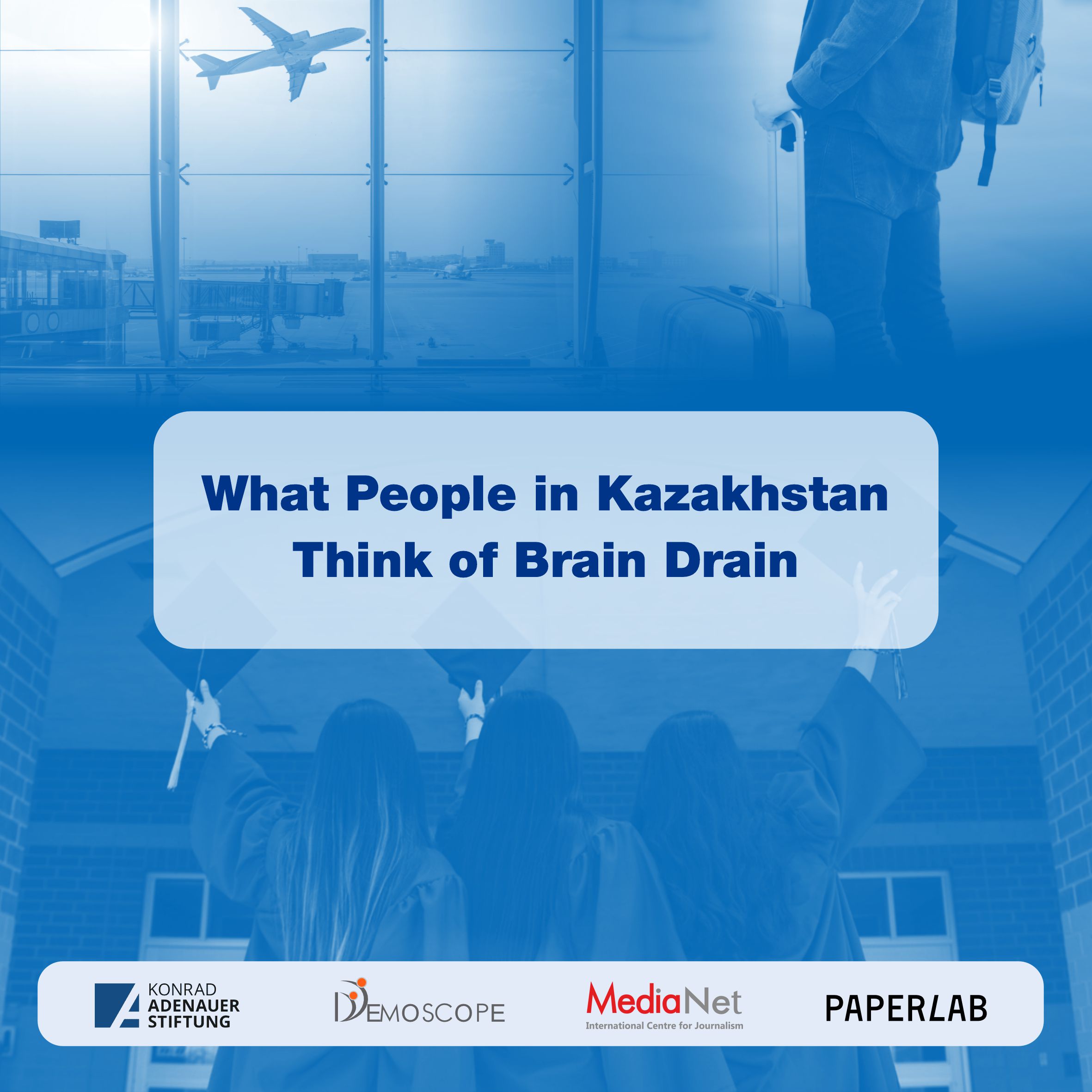
Main Reasons: Low Income and Lack of Optimism for the Future
From November 13 to 24, 2024, the DEMOSCOPE Express Public Opinion Monitoring Bureau conducted a survey on the topic of “What People in Kazakhstan Think Of Brain Drain.” The project is implemented by MediaNet International Centre for Journalism in collaboration with the PAPERLAB Research Center, with support from the Konrad Adenauer Foundation.
The DEMOSCOPE Bureau studied migration sentiments in Kazakhstan and citizens’ perceptions of the reasons behind the outflow of skilled professionals. According to the survey results, every fifth respondent (21%) is considering leaving the country. Of these, 6.9% intend to emigrate within the next 2–3 years. Another 5.6% plan to emigrate but currently lack the means, and 8.4% would consider emigrating under certain circumstances. Meanwhile, 78.5% of respondents do not plan to leave the country in the coming years.
The analysis shows that the desire to emigrate correlates strongly with the respondents’ age. Migration sentiments are most pronounced among the most active segments of the population—youth and middle-aged individuals. In the 18-29 age group, approximately 25% are considering emigration, while among those in their 30s, this figure reaches nearly 30%. Notably, one in ten people in the latter age group has firm intentions to emigrate (10.7% “plan to leave in the next 2-3 years”).
It is important to note that the vast majority of respondents (83.7%) have lived in Kazakhstan since birth, with another 9.3% residing in the country for over 20 years. Only 6.8% have lived in Kazakhstan for less than 20 years.
Respondents who expressed an intention to leave the country were asked to specify their reasons for considering emigration. Most cited the desire for higher wages (24.5%), lack of prospects for themselves and their children (23.9%), and the desire to find better job opportunities (14%). It is interesting to note that younger respondents are more often motivated by the pursuit of quality education and opportunities for self-development, whereas middle-aged and older groups more frequently mention a lack of prospects for themselves and their children.
Additional reasons for emigration included:
- More favorable conditions for self-development (13.2%)
- Access to quality education (11.7%)
- Better healthcare services (4.9%)
- Opportunities for professional growth (4.4%)
- Better environmental conditions and climate (3.8%)
- Travel opportunities (3.3%)
- Safer living conditions (3%)
- Relocating to join family members (2.6%)
- Expanding social networks (1.3%)
- Business development opportunities (0.7%)
- Returning to ancestral homelands (0.6%).
According to official data, Kazakhstan has recorded positive net migration over the past two years, with more people arriving than leaving the country. During the first three quarters of 2024, more than 20,000 people moved to Kazakhstan for permanent residence, while 10,200 left.
However, positive migration balance reflects only quantitative, not qualitative, aspects. The level of education and professional qualifications of migrants remain key indicators in analyzing migration processes.
Among those who emigrated, a significant proportion included specialists in high-demand technical fields (1,200 people), economists (589), educators (385), architects and builders (261), and lawyers (170).
Despite official data, the DEMOSCOPE survey revealed that nearly half of respondents (45.9%) reported that someone among their friends, acquaintances, or colleagues had emigrated abroad for permanent residence in the past 2–3 years.
The societal attitude toward emigrants is also a significant indicator. Most Kazakhs (63.3%) expressed understanding regarding their compatriots’ decision to move abroad. Only 11.4% disapproved, while 21% expressed indifference.
When forecasting future migration trends, most respondents (39.2%) believe the outflow of skilled professionals from Kazakhstan will increase over the next 3–5 years. Conversely, 21.7% expect an increase in immigration to the country. Another 18.7% believe the number of arrivals and departures will balance out, while 20.4% were undecided.
The most attractive countries for emigration among Kazakh citizens are: United States (7.7%), Russia (6.2%), European countries (5.1%), Turkey (4.6%), Canada (2.6%). However, 35% of respondents stated that they have no particular country where they would like to move.
The issue of brain drain is closely linked to citizens’ quality of life and the effectiveness of public governance. The DEMOSCOPE study not only highlighted a high level of migration sentiment among the most active segments of the population but also outlined a broad range of socio-economic factors influencing potential emigrants’ decisions.
Addressing the outflow of skilled professionals requires a systematic approach, including measures to improve citizens’ economic well-being, the quality of education, access to modern healthcare, and ensuring safety. Without enhancing governance quality and implementing targeted measures to support professional talent, reversing the brain drain trend in Kazakhstan will be extremely challenging.
Note: In some questions, respondents could select multiple answers. Detailed survey results are available on the project’s website.
Press releases and infographics in Kazakh and Russian are available via the provided link.
When using the material, a hyperlink to the DEMOSCOPE website is mandatory.
______________________________________________________________________
Methodology
From November 13 to 24, 2024, a survey of 1,100 people was conducted across 17 regions and cities of national significance (Astana, Almaty, and Shymkent) via telephone interviews with Kazakh mobile subscribers. The sample was based on a database of numbers generated randomly. The survey was conducted by the contact center of “KT CloudLab” LLP.
Participants included 47.4% men and 52.6% women aged 18 and older, with 50.4% responding in Kazakh and 49.6% in Russian. The ethnic composition of respondents was 68.3% Kazakhs, 15.3% Russians, and 15.4% representatives of other nationalities. Additionally, 67% of respondents live in urban areas, while 32.4% reside in rural areas. Data were weighted by parameters such as gender and age. The maximum margin of error is ±3% with a 95% confidence level. The response rate was 9%. The survey was conducted by MediaNet International Centre for Journalism Public Foundation with the support of Konrad Adenauer Foundation. For further information, contact project coordinator Snezhana Tsoy at snezhana.tsoy@medianet.ngo.
